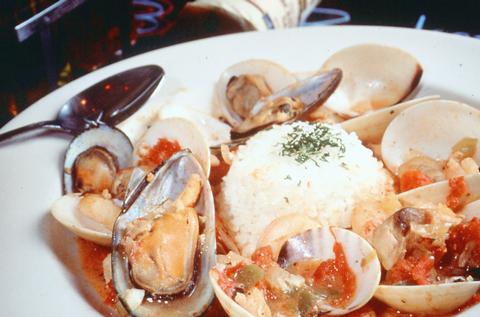For the last 10 years, Dan Ryan's has been doing the same thing. It has changed little either in decor or in menu. The reason for this is that having found a good recipe, it has had little reason to tinker with a good thing. It is not surprising that it has a strong base of regular customers, both foreign and local, who appreciate the fact that it has never tried to compromise on its American style.
Dark wood, sporting memorabilia and souvenirs of a 1940s Chicago, this is a little piece of the American heartland in Taiwan. Its Superbowl day has become a tradition among many expatriates, a tradition that the restaurant maintains although it has long ceased to be profitable. "It is about tradition," said Nia Chen (陳佩儀), the restaurant manager.
The restaurant announces proudly on its menu that it serves American portions, a warning that should not be taken lightly. Attentive wait staff warn the unwary, for at Dan Ryan's even a salad can easily constitute a main course. But the great standards hark back to the days of the railway tycoons when appetites were big and there was always time for another beer. Start off with the clam chowder, a solid soup with nice big clams inside. Move on another house special, the slab of ribs. Ribs are ribs, and there isn't a whole lot of variation wherever you go. Dan Ryan's doesn't try anything fancy, but top-quality local pork and the right touch with the grill, make this a sure hit with dedicated carnivores. For something a little lighter, go for the cioppino, an Italianesque seafood and rice combo that is not too easy to place geographically but with its hints of cajune spiciness and Mediterranean seasonings, sizeable chunks of crab, fish, and whole prawns and mussels, this is a veritable feast that could easily be shared between two light eaters. Dan Ryan's also provides some of the best burgers and hot sandwiches in town. The Ruben sandwich is especially recommended, but is definitely not for the calorie conscious.

PHOTO COURTESY OF DAN RYAN'S
Indeed, Dan Ryan's keeps faith with an earlier age most obviously in its desserts, which make no concessions. It's brownie, imported directly from New York, is about as dense and chocolaty as you could want, and topped with a giant scoop of Hagan Daaz macadamia nut ice cream, you are looking at a temptation that is likely to break the will of the most ardent weight watcher.
While Dan Ryan's is firmly placed in the upper bracket of eateries, it continues to offer incredible value for money, and for some reason that is an important part of the restaurant's charm, it manages to maintain a high level of professionalism while avoiding fussy pretentiousness.
The bar is simple and competent, avoiding fancy cocktails for a good control of the basics. And in any case, beer is the drink of choice for most customers, according to Chen.

Beijing’s ironic, abusive tantrums aimed at Japan since Japanese Prime Minister Sanae Takaichi publicly stated that a Taiwan contingency would be an existential crisis for Japan, have revealed for all the world to see that the People’s Republic of China (PRC) lusts after Okinawa. We all owe Takaichi a debt of thanks for getting the PRC to make that public. The PRC and its netizens, taking their cue from the Chinese Communist Party (CCP), are presenting Okinawa by mirroring the claims about Taiwan. Official PRC propaganda organs began to wax lyrical about Okinawa’s “unsettled status” beginning last month. A Global

We lay transfixed under our blankets as the silhouettes of manta rays temporarily eclipsed the moon above us, and flickers of shadow at our feet revealed smaller fish darting in and out of the shelter of the sunken ship. Unwilling to close our eyes against this magnificent spectacle, we continued to watch, oohing and aahing, until the darkness and the exhaustion of the day’s events finally caught up with us and we fell into a deep slumber. Falling asleep under 1.5 million gallons of seawater in relative comfort was undoubtedly the highlight of the weekend, but the rest of the tour

Youngdoung Tenzin is living history of modern Tibet. The Chinese government on Dec. 22 last year sanctioned him along with 19 other Canadians who were associated with the Canada Tibet Committee and the Uighur Rights Advocacy Project. A former political chair of the Canadian Tibetan Association of Ontario and community outreach manager for the Canada Tibet Committee, he is now a lecturer and researcher in Environmental Chemistry at the University of Toronto. “I was born into a nomadic Tibetan family in Tibet,” he says. “I came to India in 1999, when I was 11. I even met [His Holiness] the 14th the Dalai

Music played in a wedding hall in western Japan as Yurina Noguchi, wearing a white gown and tiara, dabbed away tears, taking in the words of her husband-to-be: an AI-generated persona gazing out from a smartphone screen. “At first, Klaus was just someone to talk with, but we gradually became closer,” said the 32-year-old call center operator, referring to the artificial intelligence persona. “I started to have feelings for Klaus. We started dating and after a while he proposed to me. I accepted, and now we’re a couple.” Many in Japan, the birthplace of anime, have shown extreme devotion to fictional characters and